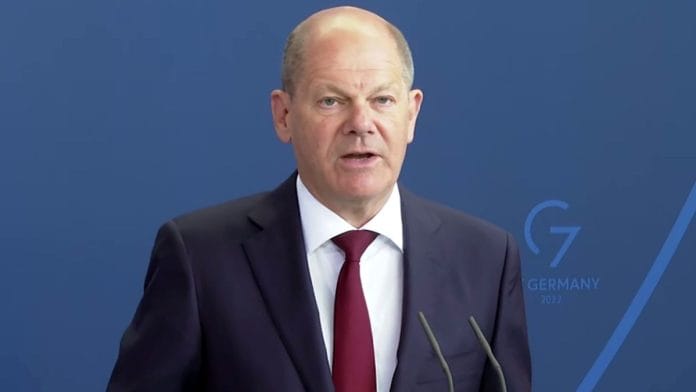New Delhi: Calling China ‘a partner, competitor and systemic rival’, Germany in a document has emphasised the need to reduce its dependence on China in ‘critical sectors’ across areas of rare earths, medicinal technology, and lithium batteries among others.
While focusing on the need to change the country’s approach on political, economic and security ties with China, Berlin does not seek to ‘engage in decoupling’ with the country, the government announced Thursday.
Releasing its first ever ‘Strategy on China’, a 64-page document, the German government urged its companies to move away from their reliance on the second-largest global economy and engage in ‘de-risking’ practices. German companies such as BMW, Volkswagen view China as a key market and Berlin stated that it plans to talk to firms “particularly exposed” to the country.
“We want to preserve our close economic ties with the country,” German Chancellor Olaf Scholz tweeted Thursday. “However, we want to become less dependent on critical sectors in order to reduce the risks they entail.”
China was one of Germany’s most important trade partners in 2022 for the seventh year in a row, with trade reaching nearly $320 billion in 2022. Through this document, the country has stressed on maintaining its economic ties with China while diversifying its supply chains to reduce risks. It also highlights how China has ‘exploited other countries’ dependencies in the past’.
“China has changed. As a result of this and China’s political decisions, we need to change our approach to China,” the report says.
Foreign Minister Annalena Baerbock tweeted, “We don’t want to disconnect from China. We want to minimise our risks. This includes promoting our economy in Europe as well as reducing dependencies. The more diverse trade and supply chains are set up, the more resilient our country is.”
Also read: China happy to let citizens believe US treasury secretary came ‘begging’
‘China endeavouring to influence international order’
In its assessment of China, the report notes that Berlin is “observing with concern how China is endeavouring to influence the international order in line with the interests of its single-party system and thus to relativise the foundations of the rules-based international order, such as the status of human rights.”
The document also observes China’s ties with Russia as a threat to Germany’s national security.
Thus, the report aims to enable the government to ‘assert its interests more effectively’ as well as ‘give coherence to their policies on China’.
It discusses Germany’s overdependence on sectors like medicine and energy and emphasises on the disadvantages the country faces against Chinese companies due to restricted market access, exclusion from public procurement, and unequal competition and more.
It further assesses that China is attempting to use ‘unfair practices’ to create these dependencies to ‘assert its political objectives and interests’ on Germany.
“Unfair practices on the part of China can have a negative impact on our security, sovereignty and prosperity. We must address this threat in Germany and at the European level with suitable means”, the strategy states.
The document builds on Germany’s first national security strategy, issued last month, and focuses on a “systemic rivalry” between the two nations. Creating a “comprehensive China strategy” was a part of the pledges Scholz’s three-party coalition had made when it first came to power in 2021.
Germany is not the first country to reveal a dedicated strategy on tackling China. A British parliamentary committee overseeing its intelligence community Thursday also revealed a report on the government’s ‘inadequate’ methods to deal with a growing Chinese threat.
(Edited by Zinnia Ray Chaudhuri)
Also read: Who after Xi Jinping? No clear successor means chaos ahead for China






